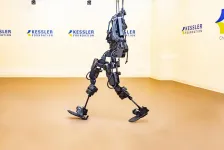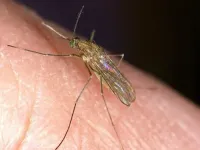(Press-News.org) East Hanover, NJ. May 28, 2021. A team of researchers has shown that physical intervention plans that included exoskeleton-assisted walking helped people with spinal cord injury evacuate more efficiently and improved the consistency of their stool. This finding was reported in Journal of Clinical Medicine on March 2, 2021, in the article "The Effect of Exoskeletal-Assisted Walking on Spinal Cord Injury Bowel Function: Results from a Randomized Trial and Comparison to Other Physical Interventions" (doi: 10.3390/jcm10050964).
The authors are Peter H. Gorman, MD, of the University of Maryland School of Medicine, Gail F. Forrest, PhD, of Kessler Foundation's Tim and Caroline Reynolds Center for Spinal Stimulation, Dr. William Scott, of VA Maryland Healthcare System, Pierre K. Asselin, MS, Stephen Kornfeld, MD, Eunkyoung Hong, PhD, and Ann M. Spungen, EdD, of the James J. Peters VA Medical Center.
Bowel dysfunction, a common experience after spinal cord injury, can lead to chronic constipation and incontinence, causing discomfort and frustration. In one survey, more than a third of men with spinal cord injury reported that bowel and bladder dysfunction had the most significant effect on their lives post-injury. Unfortunately, these issues are not easily managed.
Rehabilitation professionals have traditionally managed bowel dysfunction using approaches that target the gastrointestinal system or require manual intervention, but some newer research suggests that physical activity and upright posture may enhance bowel motility. However, few studies have explored the possibility that exoskeletal-assisted walking--in which a person with spinal cord injury wears a robotic suit, enabling them to stand and walk--may be an effective addition to existing intervention plans.
In this study, the research team investigated whether exoskeletal-assisted walking improved bowel function in people with chronic spinal cord injury. They performed a three-center, randomized, controlled, crossover clinical trial in which 50 participants completed 36 sessions of exoskeletal-assisted walking. The researchers evaluated bowel function as a secondary outcome in 49 participants. Bowel function was measured via a 10-question bowel function survey, the Bristol Stool Form Scale, and the Spinal Cord Injury Quality of Life Bowel Management Difficulties instrument.
Results showed that the exoskeletal-assisted walking program provided some improvement in bowel function when compared to a control group. "We saw a notable reduction in bowel evacuation time, with 24 percent of participants reporting an improved experience," said Dr. Forrest, co-author and associate director of the Center for Mobility and Rehabilitation Engineering Research at Kessler Foundation. "We also noted that participants' stools trended toward better consistency, supporting our hypothesis that this intervention may improve several measures of bowel function."
"Our results support the idea that walking, and not just standing, may have a beneficial effect on bowel function," said Dr. Gorman, co-author and chief of the Division of Rehabilitation Medicine at the University of Maryland Rehabilitation and Orthopaedic Institute. "Our goal is to improve the quality of life of those with chronic spinal cord injury, and these encouraging results will help inform future studies on the emerging field of mobility intervention."
INFORMATION:
Funding: Department of Defense/CDMRP SC130234, Award: W81XWH-14-2-0170, and National Center for the Medical Consequences of SCI (B9212-C, B2020-C) at the James J. Peters Veterans Affairs Medical Center. Additional local support was provided by the James Lawrence Kernan Endowment Fund, Baltimore, Maryland; a philanthropic gift from Dr. Bert Glaser at the Baltimore site; and The Bronx Veterans Medical Research Foundation at the Bronx site.
For information on current research studies, visit https://kesslerfoundation.org/research/studies/spinal-cord-injury, or email ResearchStudies@kesslerfoundation.org
About Kessler Foundation
Kessler Foundation, a major nonprofit organization in the field of disability, is a global leader in rehabilitation research that improves cognition, mobility and long-term outcomes, including employment, for people with neurological disabilities caused by diseases and injuries of the brain and spinal cord. Kessler Foundation leads the nation in funding innovative programs that expand opportunities for employment for people with disabilities. Learn more by visiting http://www.KesslerFoundation.org
Learn more about ongoing studies at Kessler Foundation at Join Our Research Studies | Kessler Foundation
Contact: Carolann Murphy, PA, Assistant Editor; Cmurphy@KesslerFoundation.org
Neurological disorders such as Parkinson's disease and epilepsy have had some treatment success with deep brain stimulation, but those require surgical device implantation. A multidisciplinary team at Washington University in St. Louis has developed a new brain stimulation technique using focused ultrasound that is able to turn specific types of neurons in the brain on and off and precisely control motor activity without surgical device implantation.
The team, led by Hong Chen, assistant professor of biomedical engineering in the McKelvey School of Engineering and of radiation oncology at the School of Medicine, is the first to provide direct evidence showing noninvasive, cell-type-specific ...
Corals are in trouble. All across the globe the diverse and dynamic ecosystems are taking huge hits year after year. The Great Barrier Reef has lost half of its coral since 1995. Scientists are seeing similar declines in reefs from Hawai'i to the Florida Keys and across the Indo-Pacific region.
The widespread decline is fueled in part by climate-driven heatwaves that induce coral bleaching -- the breakdown of the relationship between shallow-water coral and the symbiotic algae they rely upon for nutrients.
Climate change is a clear and present danger to the persistence of coral reefs, and global reductions in carbon emissions is ...
East Hanover, NJ. May 28, 2021. A team of multiple sclerosis (MS) experts at Kessler Foundation led the first pilot randomized controlled trial of robotic-exoskeleton assisted exercise rehabilitation (REAER) effects on mobility, cognition, and brain connectivity in people with substantial MS-related disability. Their results showed that REAER is likely an effective intervention, and is a promising therapy for improving the lives of those with MS.
The article, "A pilot randomized controlled trial of robotic exoskeleton-assisted exercise rehabilitation in multiple sclerosis," (doi: 10.1016/j.msard.2021.102936) was published on April 4, 2021, by Multiple Sclerosis and Related Disorders. It is available open access at https://www.msard-journal.com/article/S2211-0348(21)00203-0/fulltext.
The ...
Adults with cerebral palsy are more likely to experience the debilitating pains of musculoskeletal disorders, but they receive significantly less physical therapy for those ailments, according to a recent study.
The findings, published in Disability & Health, analyzed four years of Medicare service claims from community-living older adults with and without cerebral palsy who had one or more ambulatory claims for a musculoskeletal diagnosis. Fewer than one-third of general population patients utilized physical therapy. Those with cerebral palsy, despite having greater risk of secondary comorbid conditions, received even less physical therapy.
"The results are staggering, but they support our hypothesis that people with cerebral palsy receive inequitable health care," says Mark ...
Climate change will make outbreaks of West Nile virus more likely in the UK within the next 20-30 years, scientists say.
West Nile virus is spread by mosquitoes and has no vaccine. Most people have no symptoms, but it can cause serious neurological disease.
Scientists from the UK Centre for Ecology & Hydrology (UKCEH), Biomathematics and Statistics Scotland (BioSS) and the University of Glasgow developed a new model to determine the risk of a West Nile virus outbreak in the UK.
They found the risk is low for the next two to three decades, but will increase as temperatures ...
The drug diABZI -- which activates the body's innate immune response -- was highly effective in preventing severe COVID-19 in mice that were infected with SARS-CoV-2, according to scientists in the Perelman School of Medicine at the University of Pennsylvania. The findings, published this month in Science Immunology, suggest that diABZI could also treat other respiratory coronaviruses.
"Few drugs have been identified as game-changers in blocking SARS-CoV-2 infection. This paper is the first to show that activating an early immune response therapeutically with a single dose is a promising strategy for controlling the virus, including the South African variant ...
What The Study Did: Rates of antispike antibody response to a messenger RNA SARS-CoV-2 vaccine in Israeli patients with cancer who are undergoing systemic treatment compared with healthy controls were evaluated in this study.
Authors: Salomon M. Stemmer, M.D., of the Rabin Medical Center in Petah Tikva, Israel, is the corresponding author.
To access the embargoed study: Visit our For The Media website at this link https://media.jamanetwork.com/
(doi:10.1001/jamaoncol.2021.2155)
Editor's Note: The article includes conflict of interest disclosures. Please see the article for additional information, ...
What The Study Did: This study evaluates whether there are differences in SARS-CoV-2 seroprevalence and antibody levels in patients with cancer compared with health care workers in Japan.
Authors: Tatsuya Yoshida, M.D., Ph.D., of the National Cancer Center Hospital in Tokyo, is the corresponding author.
To access the embargoed study: Visit our For The Media website at this link https://media.jamanetwork.com/
(doi:10.1001/jamaoncol.2021.2159)
Editor's Note: The article includes conflict of interest and funding/support disclosures. Please see ...
What The Study Did: Socioeconomic disparities in respiratory health over the past six decades in the United States are described in this study.
Authors: Adam W. Gaffney, M.D., of the Cambridge Health Alliance in Cambridge, Massachusetts, is the corresponding author.
To access the embargoed study: Visit our For The Media website at this link https://media.jamanetwork.com/
(doi:10.1001/jamainternmed.2021.2441)
Editor's Note: The article includes conflicts of interest disclosures. Please see the article for additional information, including other authors, author contributions and affiliations, conflict of interest and financial disclosures, and funding and support.
# # ...
What The Study Did: Study results suggest that reinfections are rare events and that patients who have recovered from COVID-19 have a lower risk of reinfection. However, the observation ended before SARS-CoV-2 variants began to spread, and it is unknown how well natural immunity to the wild-type virus will protect against variants. .
Authors: Nicola Mumoli, M.D., of the Ospedale Fornaroli in Magenta, Italy, is the corresponding author.
To access the embargoed study: Visit our For The Media website at this link https://media.jamanetwork.com/
(doi:10.1001/jamainternmed.2021.2959)
Editor's ...


